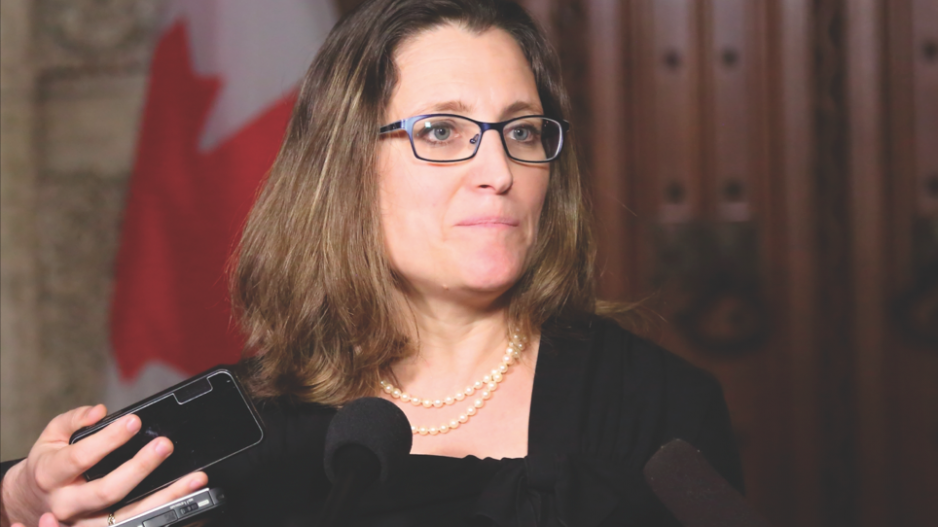Canadian diplomats in China have been warned to be cautious and embassy and consular security increased following the arrest of a Chinese telecommunications executive in B.C.
At the same time, one Canadian has been detained in China and another has disappeared.
Huawei chief financial officer Meng Wanzhou was detained Dec. 1 at Vancouver International Airport, where Canadian police acted on a provisional arrest warrant from the United States under an extradition treaty between countries.
Meng was released on bail of $10 million in cash and sureties Dec. 11 in Vancouver, and awaits possible extradition to the United States.
Minister of Foreign Affairs Chrystia Freeland stressed Canada is operating under its treaty obligations to the United States.
“There was no political involvement,” Freeland said. “Canada will very faithfully follow the rule of law.”
Meng is accused of conspiracy to defraud multiple international financial institutions in relation to international sanction violations. She’s the daughter of Ren Zhengfei, founder of Huawei, the world’s largest telecommunications equipment manufacturer. Ren is worth an estimated $3.2 billion.
B.C. Supreme Court Justice William Ehrcke ruled Meng must live under house arrest between 11 p.m. and 6 a.m. in her family’s multimillion-dollar Vancouver home and surrender her passports to RCMP, among other conditions.
Federal government officials said Canada must respect obligations to extradition treaty partners and that Meng’s rights to due process in Canada’s courts will be respected.
Freeland said China was informed of Meng’s arrest the day it happened. Meng was given consular access that day, Freeland added.
The U.S. has 60 days to make a full extradition request to Ottawa after which Canada has 30 days to issue an authority to proceed to BC Supreme Court.
The court can reject extradition if it violates Canada’s Charter of Rights and Freedoms. Meng can also challenge charges made against her by the U.S. She can appeal a BC Supreme Court decision to both the BC Court of Appeal and then the Supreme Court of Canada.
However, officials agree this case could drag on like other such cases that have taken many years.
Should extradition be granted, the final decision to send Meng to the U.S. sits with federal minister of justice, currently Jody Wilson-Raybould.
The minister can refuse if surrender would result in oppressive or unjust treatment; if it would be inappropriate due to concerns around race, religion, nationality, ethnic origin or colour; or if the requesting country has the death penalty. In the last case, surrender can happen if the requesting country assures the death penalty would not be used.
Wilson-Raybould said in a statement that extradition involves a “careful balancing of the interests of the person sought for extradition against Canada’s international obligations.
“The person sought is able to challenge their extradition at multiple levels, both before the superior and appellate courts in Canada, and by making submissions to me on the issue of surrender,” Wilson-Raybould said.
Meng’s counsel has a right to know what information the minister had to make the decision should a judicial appeal be needed, officials said.
Officials said more than 90% of U.S. extradition requests to Canada are successful.
While it is rare, the U.S. could withdraw the extradition request.
A fly in the ointment has been President Donald Trump’s assertion he would use Meng as a bargaining chip in trade negotiations with China. Officials said comments on how Meng’s lawyers might use that assertion would be speculative.
Freeland said she has spoken with U.S. Secretary of State Mike Pompeo about the Meng case and told him how Canada’s system works.
Meanwhile, Ottawa is seeking access to former Canadian diplomat Michael Kovrig, who was detained Monday by the Beijing Bureau of State Security.
Canadian officials are speaking with both the Chinese ambassador to Canada and embassy officials to determine why Kovrig was detained and where he is.
Officials said they have no indication if Kovrig was detained in retaliation for Meng’s arrest. They said he is a diplomat on leave to work with a nongovernmental organization and, as such, does not currently have protective diplomatic status in China.
“We agonize over these cases,” Freeland said. “The fact Mr. Kovrig is an employee of the department is relevant. We’re very concerned about him.”
Freeland said the government’s concerns have been communicated to China’s ambassador to Canada and Kovrig’s family.
A second Canadian had contacted Canadian officials saying Chinese authorities were questioning him. He has since been unreachable; Freeland said Canadian officials are looking for him.
Canadian diplomats in China and travellers to that country have been warned to exercise “a high degree of caution” due to anti-Canadian sentiment following Meng’s arrest, officials said.
“The Chinese have stepped up security around our embassy,” the official said.
The case has focused international scrutiny on Huawei, in part because three members of the so-called Five Eyes intelligence alliance of the United States, New Zealand and Australia have banned the company from involvement in build-out of next-generation communications technology. Only Canada and the United Kingdom have yet to act.
The bans are due in part to fears China-based telecommunications companies would pass data to Chinese intelligence services.




